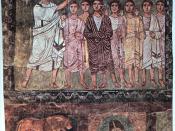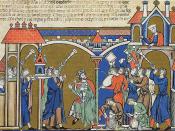� PAGE �5�
The Davidic Monarchy: What does it mean to us?
History and Literature of Ancient Israel
HIS 111-CD21
Katrina Krall
Professor Ragsdale
September 24, 2006
�
According to author Ray C. Stedman (1997), David came in to power rather unexpectedly, as he "began with a few sheep-and suddenlyâ¦God exalted him and made him King over Israel, a man of extraordinary wealth and power" (p. 164). Although it would be many years before David could physically take the throne, he would eventually become one of the most well known kings in the history of Israel. In this paper we will discuss the rise and fall of King David, examine his significance in history and in his relationship with God, and compare his sins to the reoccurring sins of humanity as a whole. Let us first begin with the story of his journey to the throne.
After God rejected the foolish and corrupt Saul, Israel's first king, He sent Samuel to Bethlehem to anoint David as the successor (1 Samuel 16:1-13).
However, the transition was painfully gradual. Rather than claiming the throne that day, David returned to caring for the sheep, but "The Spirit of The Lord came upon David from that day forward," (1 Samuel 16:13) and "The Spirit of The Lord departed from Saul" (1 Samuel 16:14). Author of An Historical Survey of the Old Testament, Eugene Merrill explains that, coincident with God's rejection of Saul and subsequent anointing of David, the Spirit left the king and an evil spirit began to trouble him incessantly" (2004, p. 194). Although Saul was no longer considered King in the eyes of God, he remained ruler of the physical kingdom for many years.
In the years to come, David would spend his time tending to his flocks and occasionally acting...


